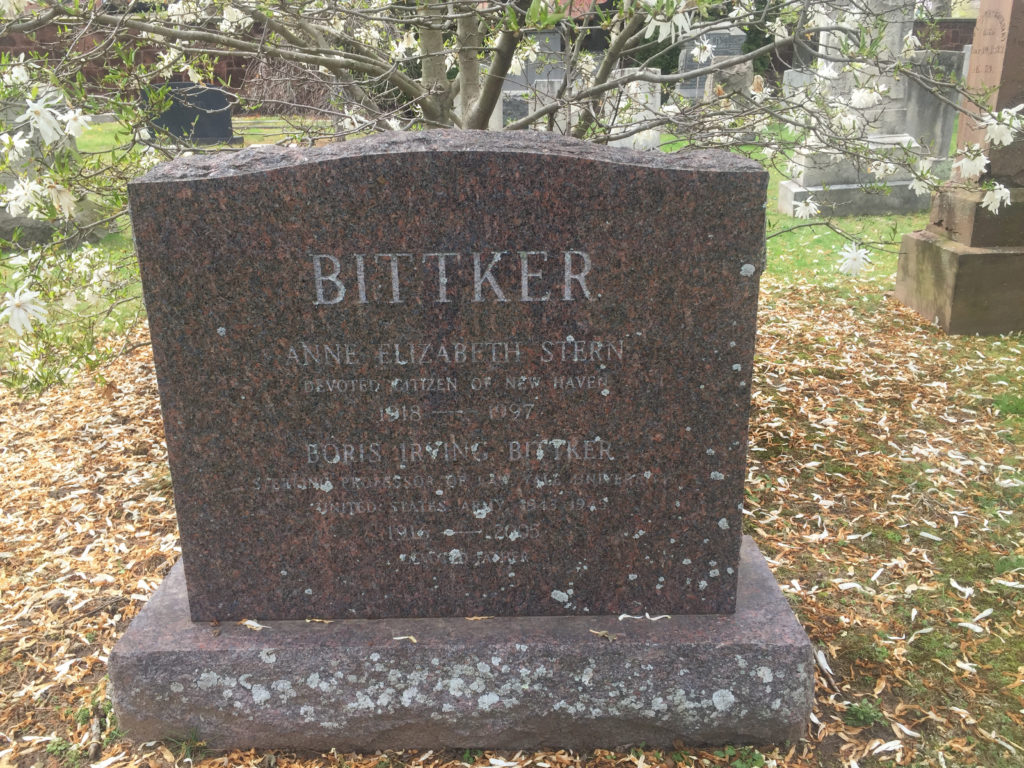Erik Visits an American Grave, Part 953
This is the grave of Boris Bittker.

Born in 1916 in Rochester, New York, Bittker went to Cornell University graduating in 1938. He then went to Yale Law, where he finished in 1941. He clerked for a year and then got a job with the Lend-Lease Administration. In 1943, he joined the military, fighting in France with the 42nd Infantry. He was wounded and won the Purple Heart.
Upon his return from Europe, Bittker went back to working for the government, but in 1946, decided to take a job at Yale Law as a professor. He only intended to teach for a short time and then go into private practice but he stayed at Yale for the rest of his career. He rose and became a pretty highly respected law professor and thinker. He received tenure in 1951 and by 1970 was a Sterling Professor of Law there, which is the highest rank one can attain. Mostly, he worked in the rather boring world of tax law. Important, but boring to someone not involved in it. Evidently, he is one of the most important tax law thinkers in American history, or at least that’s what his colleagues said upon his death. He wrote several books on the issue, such as Federal Income, Estate, and Gift Taxation (1955), Federal Income Taxation of Corporations and Shareholders (1959), and Taxation of Foreign Income (1960). Wow, better check that fun reading out of the library.
But that’s not what we remember Bittker for. He was a solid law professor and good for him. But in 1972, responding to the civil rights movement and the structural inequality he saw even after the passage of landmark civil rights legislation, Bittker came upon a new idea to help create equality. He published a book called The Case for Black Reparations, arguing the correct case that Black Americans deserved financial compensation for the centuries of slavery and structural racism that they faced. Bittker was not the first person to ever say something like this, but he significantly popularized the idea. He took the idea from James Forman, the legendary civil rights leader who had interrupted a church service to demand reparations back in 1969.
The idea of reparations remains quite controversial. Even many liberals balk at reparations. But it is the unquestionably correct position. There is no way that we can overcome the reality of racism without taking it seriously on a financial basis. You deal with structural inequality by attacking the structures. Money is not going to solve everything. But it is a major attack at the structure. I mean, if you have a Black Lives Matter yard in your front yard as a white person, I don’t see what it is doing if you don’t support the actual means to fight racism in this country.
Bittker believed the best way to get reparations was to go into the courts for a legal remedy. Today, that would be impossible, but I can see the argument based on the legal climate of the 1970s, which was much more favorable for more radical remedies than it is today. See the many busing cases as one example. He believed as well that the case should be based upon school segregation to ground it in something the courts could grasp hold of instead of a broader but vaguer discussion of racism’s larger impact. I love the idea of presenting this to parents today who believe that Connor and Maddie just deserve the best schools and would be as outraged about government payments to families in segregated school districts as they would be about sending their own kids to those schools.
Bittker’s important work on reparations has had a significant impact. It laid out a very careful legal argument in favor of it, laying the groundwork for advancing the idea in very important ways. In fact, the book was re-released in 2003, during one of the occasional revivals of the idea on the American left.
Bittker was also a major environmentalist and served as a trustee for the National Resources Defense Council. So good for him, the NRDC has done such critically important work over the years. Evidently, he was also a good enough travel photographer to have his work displayed in many shows.
Bittker died in 2005 at the age of 88.
Boris Bittker is buried in Grove Street Cemetery, New Haven, Connecticut.
If you would like this series to visit other architects of legal remedies for racial justice, you can donate to cover the required expenses here. In fact, this is something of a first in this series. That’s because a family member of Bittker contacted me to request a visit and agreed to pay for the expenses. I am more than happy to visit your family member, so long as you are willing to cover my expenses and there is enough to say about them that I can write a decent post. So really, feel free to contact me about this. I have a couple of other of these requested posts coming soon as well. Arthur Garrity is in Wellesley, Massachusetts and Mildred and Richard Loving are in Central Point, Virginia. Previous posts in this series are archived here.


